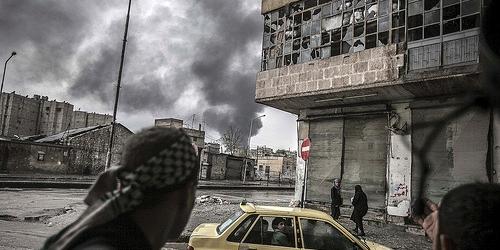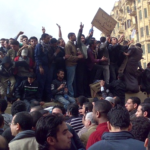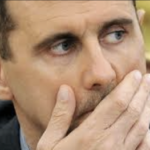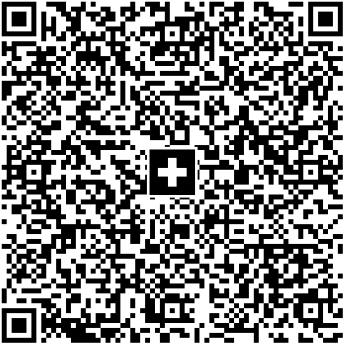Das Leben in Aleppo und Damaskus als Hölle erlebt
Red. Es sind glaubwürdige Berichte von Zivilisten über die Schrecken des Bürgerkriegs in Aleppo und die gefährliche Umgebung von Damaskus. Die Schreibenden wandten sich an Syrien-Kenner Joshua Landis, Professor an der University Oklahoma, der sie auf seiner Webseite veröffentlichte. Während mehrere Hunderttausend Syrier in Flüchtlingslagern benachbarter Länder gegen die Kälte kämpfen, geht es bei vielen Zurückgebliebenen ums Überleben.
—
Bericht einer Frau, die alle vierzehn Tage Verwandte in Damaskus besuchte
Mid-January 2013. Every two weeks my sister used to visit Damascus. She worked and lived there part time. This routine stopped about two months when the Battle of Damascus started, or the Battle of the International Airport. I was surprised two weeks ago when I contacted her and found that she was in Damascus. I was worried about her. We contact each other one or two times a day through social media, mainly on Facebook or by Skype. We discuss everything about the situation in Syria.
I asked her about her every move in Damascus. She reported back very vividly through an e mail and many chats. This is what she said:
«You know how much I love this city that I had spent years in… I reached Damascus International Airport around one in the afternoon.
The moment I exited the gate of the airport I heard an artillery discharge. I thought, jokingly, that this may be saluting me since I have not visited this city that I loved when it was peaceful for two months.
My questions started raining down on the driver from the moment I entered the car about how safe is the road? Of course, he was not feeling good about my questions, and I was not feeling good about his answer since he said to me that he is afraid of being sniped.
I asked him to drive along with the other cars if he could so we would not be alone for just a second. I asked him, of course, about the dangerous areas in our way to Damascus. He replied: »all the road is dangerous.” The airport is 25 minutes away from Damascus, about 20 kilometers, if traffic was moving well.
We drove as fast as we could, and when we reached the bridge opposite of Aqraba, the driver pointed to the area where the armed men came out off a month and a half ago and fired at the car he was driving.
They came out from between the trees. He was driving an unmarked civilian car. He told me how fast he drove till he escaped. My husband was with him in the car.
On the road I noticed the destruction of the metal partition of the highway. I asked him: »Is this because of a storm?.” He said these are the traces of battles.
The forth bridge on our way in, and the area around it are dangerous to be in. I saw a tank and a barricade over the bridge.
We started coming up on al-Qazzaz area, where there are two major Mukhabarat stations: Patrols, and the Palestine Branch. In this area a booby trapped car exploded last year when the area was crowded killing many civilians and soldiers. Here there is a barricade for the Army.
Stopping on these barricades became the daily routine of Syrians. You have to leave your house well early enough according to your experience in how much time it takes to go through these barricades. People bring tools of entertainment to kill time.
It was very cold where the Siberian Storm Olga was closing on Damascus. On this barricade I noticed smoke coming from a structure built on the island in the middle of the highway. The soldiers of the barricade set up a little enclave composed of stacked cement blocks that has a hole for smoke coming out of. The walls were few meters each direction.
We heard another artillery piece firing in the distance. It was about ten minutes from the first shot I heard. We approached the barricade and were checked. I saw two of the men of the barricade sitting close to the wood stove which has a tube about a meter long taking the smoke not that far away. They were getting worm circling the stove, smoking; a very depressing scene with temperature well bellow zero.
After this area the road became filled with cars, where I felt relatively safer. The snow started falling heavy.
I reached my home while the snow was still falling heavy outside. The house was dark because the sun had went down plus the absence of electricity. Electricity became the dearest product that is absent from the life of Syrians. Continiuos deliberate sabotage of Electrical plants plus the absence of fuel amidst sanctions made the Syrian people be deprived of electricity. Without electricity there is no heating. This grueling winter became harder with this Siberian Storm. There is no Mazot that is the most important product in these days.
Syrians searched for alternatives and they started depending on trees and whatever is growing. Wood business became a profitable business. Many unemployed found a new career: wood cutting. The skill of the wood cutter came back to life after it was almost gone. One ton of wood is sold for more than ten thousand Liras. Wood stoves are back .
I remember friends from Alleppo who visited us. Of course these days people has to talk about the important issue of heating. They told us that in their neighborhood in Alleppo there used to be a very big tree that is planted in the sidewalk a long time ago . Everyone from the hood had played underneath it when they were kids, parked there cars ander its shade, and enjoyed its smell and looks. Now, this tree is gone because the people of the street decided to cut it and divide it amongst each other for heating. There is no place for memories in times of distress.
The artillery kept on shooting periodically. They did not use the multiple rocket launchers this time. The sound of the multiple rocket launcher is like thunder.
In spite of all of this I was able to sleep a little. Damascus was all white the next day. It was very cold also.
At home I hear the artillery shooting from an area closer to our home. Shelling continued in spite of the snow. The intervals between the artilleries discharges varied. Some time it may be as long as one or two hours, or just ten minutes between two shots.
Getting food is not easy these days in Damascus. High prices made people not spend to a high degree. Prices increase weekly, if not daily. All blame the high prices on the dollar. These days even that selling parsley takes only American dollars.
This day Damascus was very cold with snow everywhere.
The men manning the barricades were still there. Someone with us tried to give an apple to one of the soldiers. The soldier could not accept because his fingers were frozen. These men are living some horrible condition. My cousin told me the other day that to boots stuck to the feet of her son, a conscript in al-Zabadani, because he wore it way to many days in the freezing temperatures.
I went out again at night looking for an internet cafe to print a text. We had no electricity at the house. I went to al-Mazah Sheikh Sa’ad, where it was very cold, but, what you think, the place was super busy.
There were people everywhere with cars lining up the streets. Traffic jams were everywhere.
There were people selling things on the sidewalk; turmus, fuul, coffee, Cappiccino. I was surprised with what I saw for many reasons; the first was the extreme cold. The second reason is the absence of fear because of the violence that hit this area many times. This area was targeted by many booby trapped cars for sectarian reasons because of its proximity to the 86 neighborhood. The third reason for why I was taken by seeing that many people out in the cold, is the astronomical high prices that is making the Syrians poor.
Although the Syrian Lira had lost half of its value, merchants took advantage of that and increased prices more than triple of that percentage. This is leading into the spreading of poverty in amongst Syrians.
I entered the first internet cafe where the space was filled with cigarette smoke, although there is a ban on smoking in communal places in Syria. It looks like every Syrian is taking advantage of this crisis in his own way. The place was very loud and crowded.
The owner came to me to apologize for not having any empty space for me. He pointed another cafe that provided the same services.
Of course my luck was not better in the second cafe. This place was colder, but still it was filled. The owner of this place also pointed me into a third place, where I found one empty spot.
After two hours, and after the clock was after ten at night, I passed by Autostrad al-Mazzeh to get back home. I saw the stores open with less than average number of clients. Damascus is trying to survive. It is resisting in spite of all of these tragedies.
The next day was my day to go back. I did not hear the sound of artillery in the morning till 11 am, when I left the house.
I saw many helicopters going back and forth on a route.
Before we left the house we read al-Fatiha many times along with many Du’a after Du’a, because anywhere you go in Damascus has inside a suicidal adventure. Danger is everywhere.
Stopping on the barricades, stopping at a traffic light, and any type of traffic jam, all of these hold inside the fear of the possibility of a booby trapped car blowing up. There is fear every where I went.
I asked the driver about every inch of the place. He is a Damascene born and grew up in al-Midan. He told me that his parents stayed there till last year when they were forced to leave their homes for sectarian reasons.
We had to cross five bridges till reaching the airport through al-Muhallaq al-Janubi.
In the beginning the traffic was slow and not like normal. I asked the driver about the reason and he said that these are unsafe area. If you look to the right there is Daria, which is only 3-4 kilometers from the highway. This area is filled with orchard and agricultural lots.
Moving towards the second bridge traffic stayed sparse, less than normal. The driver was exceeding 150 km per hour because he wanted to pass the dangerous areas. Here in front and to the right are the areas of Nahr Aisha, al-Midan and al-Zahira.
Upon reaching the third bridge the left over from the previous battles, or what is called the Battle of the Airport, were everywhere. You can see the metal partition separating both sides of the road smashed in many areas.
There is an ambulance belonging to the UN burnt and left on the side of the road. I took a picture of it from a distance. I could not take good pictures because of the high speed we were traveling in, also one should hide the camera when approaching the barricades. Every now and then here you see a tank on either side of the road.
When we got closer to the fourth bridge I asked the driver if we could stay with the other cars. He replied and said that we passed Aqraba and Bayt Sahm, which are dangerous areas and that now we are in areas relatively less dangerous.
Before the fifth bridge we saw a barricade from the distance. We also saw a truck that is carrying loose wheat driving sideways. Behind it there were three or four smaller trucks. We were stopped for few minutes. I started to panic. Traffic was not moving. I asked the driver whether this barricade belonged to the Army or to any other party. He said that this is for the regular (Assad) Army, even through you can not distinguish between the different groups since they all wear the same uniforms and erect barricades.
I asked him: Should we go back? Is there any danger?
Traffic started moving. We reached the barricade. It was manned by the army. The soldiers had also built a little house and put a tent on top of it. You still see the stove and the smoke coming out. We started getting closer to the airport. The driver seemed to be at more ease. He said that we reached the area of al-Jawiyah (The Air Force Intelligence).
We reach the airport. The parking lot is about 100 meters away for security reasons.
Of course the plane is late because of some mechanical problems.»
—
Bericht eines Bürgers von Aleppo in den USA, der täglich versucht, mit seinen Verwandten vor Ort in Kontakt zu bleiben:
Dear Dr. Landis,
I have resisted writing to you for a long time. Proud to say that I was born in Aleppo. First thing I do every morning when I wake up is check on the situation of my family in Aleppo. And for the first time today, I feel overwhelming sadness for their situation. The madness, the violence, the hatred are killing Aleppo and the innocent civilians very fast while the world is watching. Five buildings collapsed last night in a very upscale area of Aleppo. The missiles that destroyed them came from targeted civilian areas and innocent people. My nephew survived the bombing of the university and had to walk over the bodies of his students to get home, covered with blood.
Human lives are not important anymore
The city is disappearing and we’re watching. I turned often on The Today show at seven in the morning. They didn’t mention anything about the thousands of people who died this week in Aleppo or just last night. We do not care and the whole world does not care. Human lives are not important anymore.
Why I’m writing to you??? Because I want to know how in the year 2013 massacres and killings like this can happen??? Every country around the globe is responsible. They’re all playing their games. This war is one of the ugliest civil wars in history. Money, power and arms are the winners. All sides are corrupt, evil and yes, Syria is dying by the second. My heart is broken to trillions pieces.
—
Bericht eines Syriers, dessen Bruder in Aleppo von den Aufständischen als Geisel genommen und beraubt wurde
Dr. Landis,
unfortunately, I will rather if you do not mention my name because I’m so concerned about my brother…He’s very outspoken on his Facebook page about the conflict. As you know by now, most Christians support the regime. The regime is protecting the Christian area and the churches in Aleppo they’re surroanded by the government army since July. To go from one section to the other you go through security checks and they search your car. They’re so afraid of the the Free Syrian army and the Jihadists. The safety and security of their daily lives disappeared. They’re home by 5:00 or 6:00 pm behind their locked doors.
The fear of the Christians
My brother George was held hostage by the rebels in his business in the Jadiedeh district where everything is burned and destroyed. They let him go free after they videotaped him stepping on Assad’s picture, spiting on it and cursing the president. They let him go and then they destroyed his business and stole everything they could carry. So, can you imagine the fear of the Christians for the day when the Assad army is not protecting them??
Can you tell me what’s going to happen if the jihadists and rebels take control of these areas?? When we call for Assad to step down, do we have a plan for the protection of these innocent people ?? The Aleppo industrial district is destroyed beyond imagination. The equipment and machinery has been stolen and shipped to Turkey. I have members of my family who lost their factories and businesses to the rebels. My niece’s husband was taken hostage and released for 20 millions Syrian Poands. I can go on and on telling you how much this civil war has destroyed the spirit and lives of many people. I spend big chunk of my time everyday checking on everybody and I honestly can’t find the words to console anybody. I don’t know what to say anymore to my 20 year old niece who wanted to commit suicide so she’ll not hear the bombing night after night.
«The war of hate, greed and corruption»
I live far away from all this madness but I can’t deny the worries and agony I’m going through everyday. The freedom we enjoy in this country works for this society and we can’t impose it on other countries and cultures. Democracy is a process you learn when you’re young and when your thinking is not brainwashed by religion and ideologies. Why don’t we criticize Saudi Arabia or Qatar for their democracy?? Can we tell them to stop their export of arms to Syria??? No, we just want to please our allies. What’s happening in Syria is the war of United States, Russia, Saudi Arabia, Qatar and Turkey against Syria and Iran. It’s the war of the Sunni against Shia, the war of hate, greed and corruption. From the Assad family to the Tlass family and all of them, the corruption is destroying them.
The sad reality is they have destroyed the past, the present and the future for generations of Syrians. Thank you for taking the time to read my frustration and despair.
—
Siehe auch «Assad wird das Jahr 2014 als Präsident erleben»
Und «Der Weg zu einer politischen Lösung in Syrien»
Themenbezogene Interessenbindung der Autorin/des Autors
Keine










